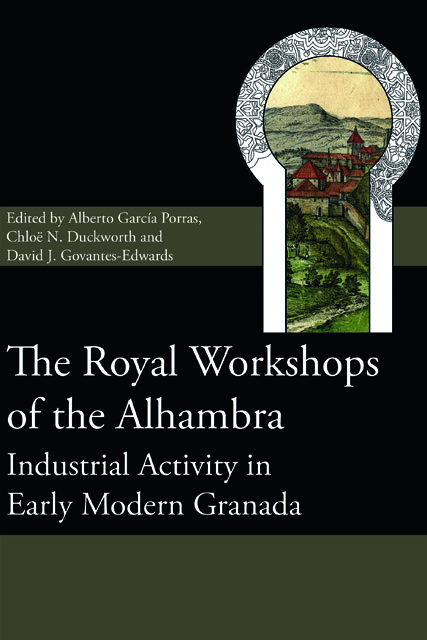Book contents
- Frontmatter
- Contents
- List of Illustrations
- List of Contributors
- Acknowledgements
- Foreword
- Introduction
- 1 The Secano: the city of the Alhambra
- 2 A holistic and reflexive methodology for the archaeological investigation of pyrotechnological activity in the Alhambra
- 3 The modern kilns
- 4 Geophysical and geochemical exploration of the industrial areas in the Alhambra
- 5 The excavation of the area of the Secano in the Alhambra: Trench 1
- 6 The excavation of the area of the Secano in the Alhambra: Trench 2
- 7 The pottery
- 8 Glass in the excavation of the Secano, the Alhambra
- 9 Furnaces at full blast: the demand for architectural ceramics for construction in the Alhambra (16th and 17th centuries)
- Conclusions
- Index
2 - A holistic and reflexive methodology for the archaeological investigation of pyrotechnological activity in the Alhambra
Published online by Cambridge University Press: 20 December 2023
- Frontmatter
- Contents
- List of Illustrations
- List of Contributors
- Acknowledgements
- Foreword
- Introduction
- 1 The Secano: the city of the Alhambra
- 2 A holistic and reflexive methodology for the archaeological investigation of pyrotechnological activity in the Alhambra
- 3 The modern kilns
- 4 Geophysical and geochemical exploration of the industrial areas in the Alhambra
- 5 The excavation of the area of the Secano in the Alhambra: Trench 1
- 6 The excavation of the area of the Secano in the Alhambra: Trench 2
- 7 The pottery
- 8 Glass in the excavation of the Secano, the Alhambra
- 9 Furnaces at full blast: the demand for architectural ceramics for construction in the Alhambra (16th and 17th centuries)
- Conclusions
- Index
Summary
Not only are pyrotechnological activities technically complex affairs but, crucially, they cannot be divided into discrete and hermetic compartments (metallurgy, ceramics, glassmaking), being characterized instead by multiple lines of cross-interaction which, from an archaeological perspective, rarely result in a tidy picture. As such, the examination of pyrotechnological practices, especially in an archaeological context as complex as the Secano, requires a wide array of research techniques to be deployed. This chapter presents an overview of the different methodologies used by the Royal Workshops of the Alhambra Project for the investigation of the industrial areas of the Secano, including several survey methods (magnetometry, magnetic susceptibility, ground-penetrating radar, and in situ chemical analysis of soil), excavation, archival research and chemical and petrographic ceramic analysis. Importantly, rather than simply listing these techniques, the chapter will combine their results to present an integrated picture of technological practice within a very specific social and political setting.
Keywords: Archaeological theory and method; research reflexivity; pyrotechnologies; early modern Spain; post-Nasrid Granada.
A Brief Theoretical Introduction
There are likely to be as many archaeological perspectives on technology as there are archaeologists, but this is not to say that there are no recognizable trends in the way archaeology has approached the issue of technology. One, perhaps the most common, especially among archaeologists who are largely involved in rescue projects, is seemingly atheoretical. Elements of material culture that can be argued to have a more or less close relation to technology are carefully described and inserted into wider narratives without much consideration being given to their points of connection with other aspects of society such as ideology or identity. In fact, there is nothing atheoretical about this position, even if the theoretical basis on which it sits is not made explicit (and is sometimes not even acknowledged as such by the archaeologists responsible for it). Theory is not necessarily an argument full of complicated words with philosophical overtones. The assumptions we have, the way we order reality in our heads, is our theoretical position, the framework within which we place and organize the data provided by our senses.
It is necessary to dispel the idea that if we do not openly or consciously embrace the theoretical premises of recognizable theoretical schools (such as processual archaeology or evolutionist archaeology), we are presenting a completely objective description of the archaeological record that can be regarded safely away from the adulteration of theoretical constructs.
- Type
- Chapter
- Information
- The Royal Workshops of the AlhambraIndustrial Activity in Early Modern Granada, pp. 17 - 26Publisher: Boydell & BrewerPrint publication year: 2022



